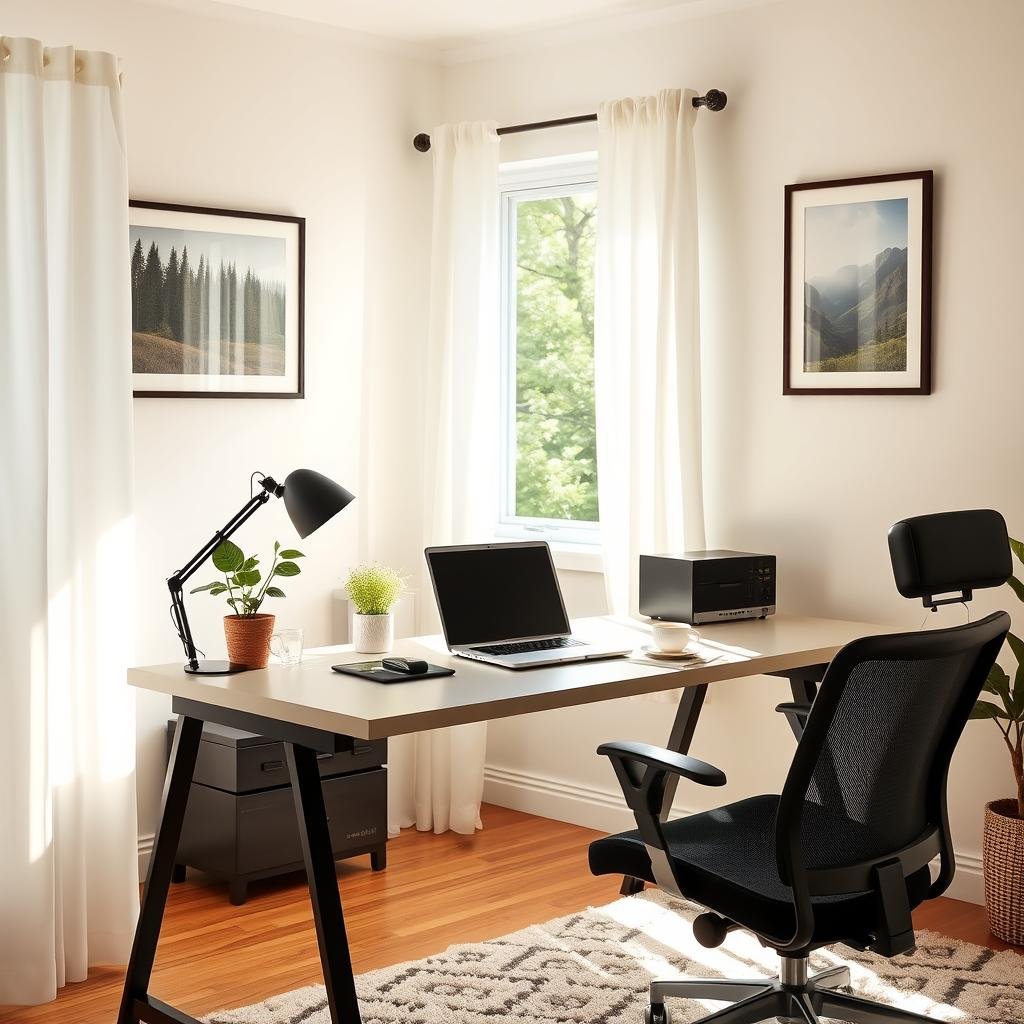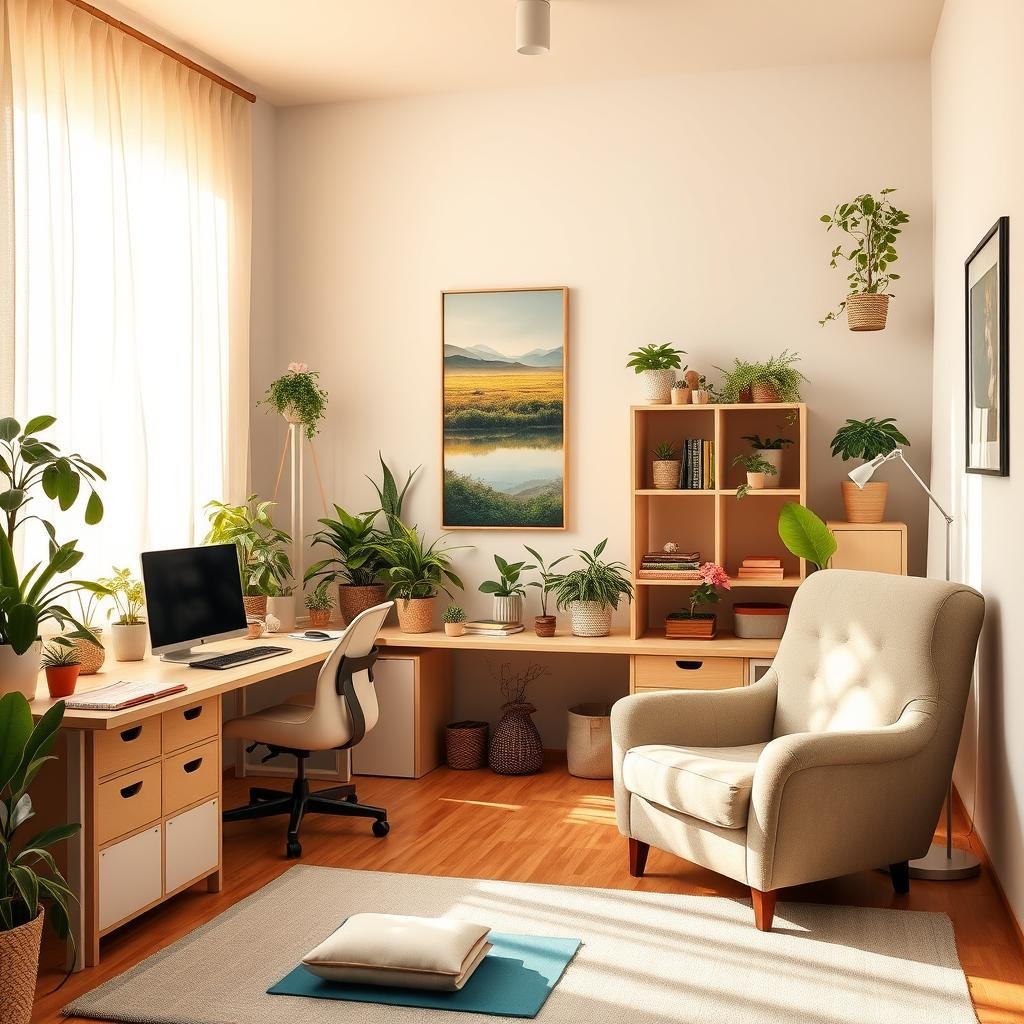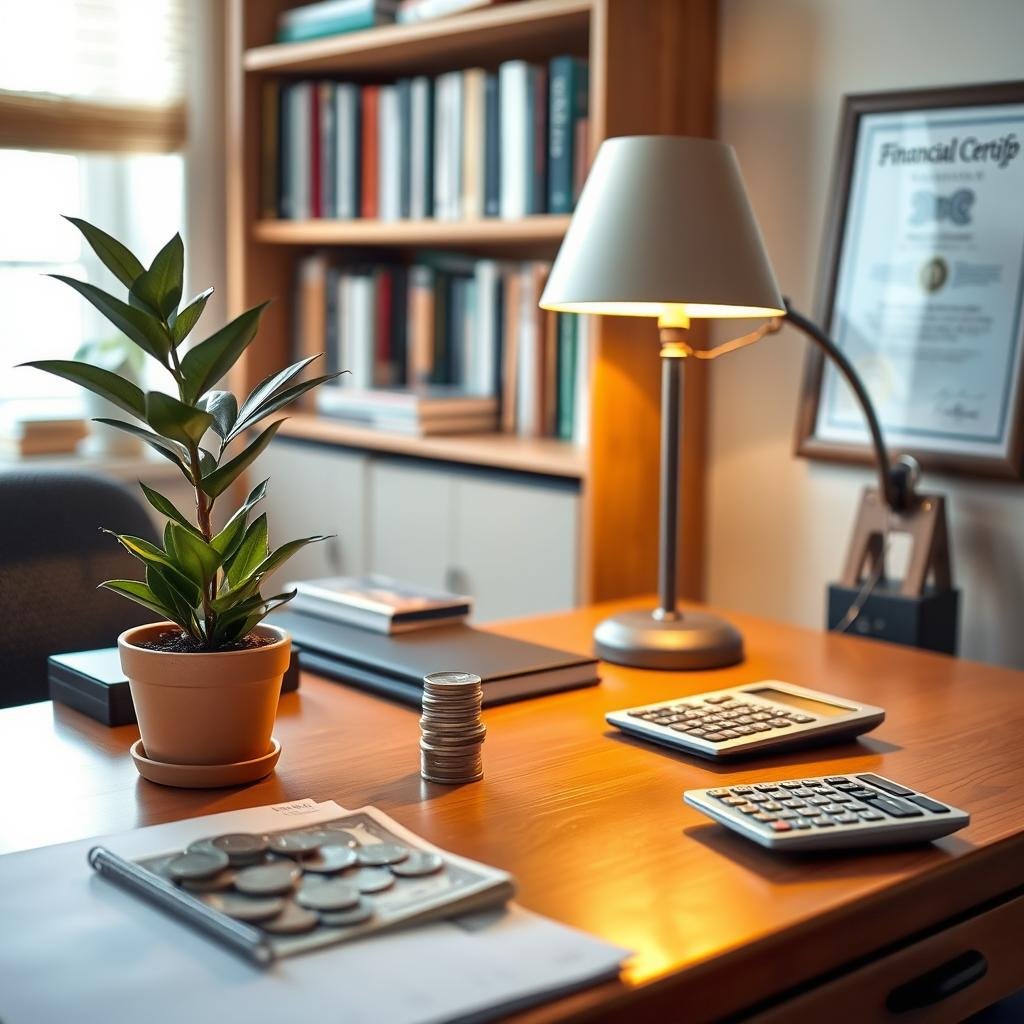Ever feel like clutter is stealing your peace? A tidy space does more than just look good—it boosts your mood and sharpens your focus. Picture walking into a clean kitchen every morning. No frantic searches for keys or stress over misplaced bills. Just calm.
Studies show messy rooms increase stress hormones. But when everything has its place, your mind feels lighter. You sleep better, breathe easier, and even save money by avoiding duplicate purchases.
Ready to transform your surroundings? Small changes create big results. Start with one drawer today. Tomorrow, tackle a shelf. Soon, you’ll notice health benefits like improved air quality and fewer allergy triggers.
Key Takeaways
- Clutter directly impacts mental and physical wellness
- Tidy spaces reduce daily stress and decision fatigue
- Organization leads to better sleep and respiratory health
- Systematic approaches prevent unnecessary spending
- Small, consistent efforts yield lasting lifestyle upgrades
Introduction: Why an Organized Home Matters
Clutter isn’t just messy—it’s a hidden thief of time and peace. The average person wastes 2.5 days a year searching for lost items. Keys, bills, that one missing sock—it adds up fast.
Chaotic spaces don’t just frustrate you. They harm your health. Cluttered homes harbor 40% more dust mites, triggering allergies and asthma. Compare that to a tidy environment: fewer sneezes, clearer air, and a calmer mind.
“Visual clutter competes for your brain’s attention, like a browser with too many tabs open.”
Neuroscience backs this up. An orderly home reduces cortisol (the stress hormone) and sharpens focus. It’s not just cleaning—it’s self-care. Start small:
- Trash expired pantry items tonight
- Designate a “home” for your wallet and phone
- Celebrate wins (yes, even that neat junk drawer!)
61% of Americans say clutter impacts their productivity. Flip the script. Your space should fuel your energy, not drain it.
The Health Benefits of an Organized Home
Breathing easier starts with a dust-free living space. When surfaces stay clear, your lungs get cleaner air. Regular cleaning slashes allergens by 73%, making every breath healthier.

Clearer Air, Fewer Allergies
Dust piles up fast in cluttered corners. It triggers asthma attacks and sneezing fits. Try the 3-foot rule: Keep allergy-prone zones (like beds and couches) clear within a 3-foot radius.
| Scenario | Air Particles (per cubic foot) |
|---|---|
| Cluttered Room | 12,000 |
| Decluttered Room | 3,400 |
“After organizing my bedroom, my sinus infections dropped from monthly to zero.” — Sarah K., Colorado
Sleep Like a Baby
Your mattress setup matters more than you think. Dust mites love messy bedding. Wash sheets weekly and vacuum under the bed. Result? Deeper sleep and fewer midnight sniffles.
- Use hypoallergenic pillow covers
- Store only essentials in bedroom closets
- Open windows daily for fresh air flow
Small changes, big wins! Your health thrives when your space does.
Mental Clarity and Reduced Stress
Your brain works best when your space isn’t fighting against it. Clutter spikes stress hormones by 27%, making even simple tasks feel overwhelming. But a tidy room? It’s like a mental reset button.

Lower Cortisol, Sharper Thinking
High cortisol levels trigger decision fatigue—ever feel paralyzed choosing an outfit in a packed closet? fMRI scans show chaotic spaces force your brain to process extra visual noise. Clear surfaces free up mental bandwidth.
| Workspace Type | Cognitive Performance |
|---|---|
| Cluttered | 42% slower task completion |
| Organized | 17% higher accuracy |
“A five-minute desk reset between meetings saves me hours weekly. Clutter is cognitive quicksand.” — Satya Nadella, Microsoft CEO
Focus Like a Pro
Top performers swear by minimalist setups. Try the 5-minute rule: Tidy one zone daily. A clear kitchen counter or desk boosts productivity by reducing distractions.
- Store frequently used items at eye level
- Use trays to corral loose papers
- Label shelves to speed up searches
Your mental health thrives when your environment supports—not sabotages—your focus. Start small and feel the difference.
The Impact on Mental Health
78% of people report immediate stress relief after decluttering. Your environment acts like a thermostat for emotions—messy spaces turn up the heat on anxiety. Neuroscience shows cluttered rooms trigger the same brain patterns as multitasking overload.

From Chaos to Calm
Clutter isn’t just visual noise—it’s emotional static. A UCLA study found cluttered homes increase cortisol levels by 15%. Real-life proof? Navy veteran Mark T. reduced his PTSD symptoms by 40% after implementing these systems:
- Assigned “zones” for different activities (reading nook, meditation corner)
- Used clear bins for medication storage to reduce decision fatigue
- Chose navy-blue folders for important documents—a color proven to lower heart rates
“Organizing my tools became therapy. The rhythm of sorting screws quieted my mind more than pills ever did.” — Mark T., San Diego
Mindfulness Through Organization
Ever snack when stressed? Clutter triggers emotional eating by 31%. Try the weighted blanket approach to rooms:
- Heavy furniture against walls creates stability
- Open floor space feels like “room to breathe”
- Round storage containers soften sharp visual edges
Pro tip: Pale green storage boxes reduce anxiety—it’s the color of hospital recovery rooms. Your mental health deserves that same peaceful energy.
More Time for What Matters
Time slips away fastest when you’re digging through clutter. Americans waste 55 minutes daily searching for things—that’s nearly two weeks per year! Imagine redirecting those hours to hobbies, family, or simply relaxing.

From Chaos to Efficiency
Cluttered spaces turn simple tasks into scavenger hunts. Compare these routines:
| Scenario | Time Spent |
|---|---|
| Before: Piles of mail, unlabeled bins | 22 minutes/day |
| After: “Home GPS” labeled zones | 3 minutes/day |
“Color-coding my kids’ school supplies saved 15 frantic mornings per semester.” — Jenna R., Ohio
Master Your Mornings
Streamlined daily routines start the night before. Try these time-saving hacks:
- Launchpad zone: Designate a tray for keys/wallet near the door
- 5-minute reset: Tidy high-traffic areas nightly
- Neon labels: Mark shelves for instant visibility
One mom reclaimed 3 hours weekly by grouping soccer gear, snacks, and work bags in labeled cubbies. Less stress, more playtime. Your turn!
Financial Savings from an Organized Home
Hidden costs lurk in every disorganized corner of your home. The average household wastes $1,200 yearly on duplicate purchases, energy inefficiency, and pest damage. But with simple systems, you can redirect those funds to what truly matters.

Efficient Appliance Use
Clogged filters and overcrowded fridges force appliances to work harder. A tidy system cuts energy bills fast:
- HVAC hack: Clean filters monthly to slash AC costs by 15%
- Fridge zones: Group dairy/produce to reduce door-opening time
- Oven efficiency: Keep vents clear for even baking (saves 20 minutes per roast)
Fewer Replacement Costs
Americans spend $2.7 billion annually rebuying lost items. Try these fixes:
- First-In Pantry System: Place new groceries behind older ones to cut food waste by 30%
- Tool checkpoints: Hang frequently used tools on shadow boards
- Digital inventory: Snap photos of rarely used items (holiday decor, camping gear)
“Labeling our spice jars saved $87 last year—no more buying cumin we already had.” — Ryan L., Texas
Prevention of Pest-Related Expenses
Termites and rodents thrive in cluttered pantries. Pest prevention starts with smart storage:
- Store flour/sugar in airtight containers (deters ants)
- Leave 3-inch gaps between walls and stored boxes (mice hate open sightlines)
- Use cedar blocks in closets to repel moths naturally
Your space shouldn’t cost you money—it should help you save. Start tonight: Clear one shelf and feel the difference.
Safety and Reduced Hazards
Your home should protect you, not put you at risk. Cluttered spaces cause 34% of home injuries—from twisted ankles to serious falls. Simple changes turn danger zones into safe havens.

Clear Pathways Prevent Falls
ER visits spike where clutter blocks walkways. Compare these stats:
| Home Layout | Injury Rate |
|---|---|
| Cluttered floors | 1 in 4 seniors fall yearly |
| Clear pathways | 73% fewer tripping hazards |
Seattle grandmother Rita M. eliminated falls by:
- Using glow-in-the-dark tape on stair edges
- Storing shoes in wall-mounted racks
- Keeping walkways 36 inches wide
Fire Prevention Through Smart Storage
Clutter fuels flames. Fire marshals recommend these zones stay clear:
- Furnace areas: 3-foot clearance all sides
- Cord management: Bundle wires with velcro, not rubber bands
- Kitchen counters: Keep appliances unplugged when idle
“After organizing our laundry room, we spotted a smoldering lint trap before it ignited.” — Fire Captain Diaz, Miami-Dade FD
Childproofing gets easier too. Try magnetic cabinet locks and rounded-edge storage bins. Your safety upgrades start with one cleared shelf today.
Boosting Productivity and Creativity
Your best ideas emerge when your space supports your flow. Organized offices see 19% higher output—not from longer hours, but from smarter setups. Google proves this with their research-backed workspace standards: clean surfaces, adjustable lighting, and designated collaboration zones.
A Distraction-Free Workspace

- Position your desk facing natural light (boosts focus by 23%)
- Keep only active projects within arm’s reach
- Use blue-light blocking lamps for evening work sessions
Compare these artist studio setups:
| Cluttered Studio | Minimalist Studio |
|---|---|
| 38 minutes daily searching for tools | Immediate access to materials |
| Frequent creative blocks | 73% faster project completion |
“My best paintings happen when I can grab any brush without looking. Organization frees my mind to create.” — Elena Petrova, Abstract Artist
Encouraging Positive Habits
Visual cues reinforce routines. Try habit-stacking:
- Place yoga mats near morning coffee stations
- Store reading glasses on meditation cushions
- Keep water bottles at keyboard level
The Sunday Reset ritual sets your week up for success:
- 10-minute desk declutter
- Meal prep container assembly line
- Outfit planning with weather-check
Your environment should pull you toward success, not hold you back. Start tonight—clear one surface and feel the creative energy flow.
Strengthening Family Dynamics
Did you know your home’s layout shapes family bonds? Clutter-free spaces turn arguments into high-fives. Families using chore charts report 42% less conflict—proof that teamwork starts with smart systems.

Clear Communication, Calmer Mornings
A Family Command Center stops the “Where’s my shoes?” chaos. Try this blueprint:
- Wall calendar: Color-code each person’s schedule
- Drop zone: Hooks for keys, bins for permission slips
- Chalkboard for daily priorities (“Math test today!”)
Seattle parents cut morning stress by 68% with this hack. Your turn!
Teamwork That Feels Like Play
Decluttering becomes a game with the Toy Rotation System:
- Store 75% of toys in labeled bins
- Swap bins weekly to keep kids engaged
- Celebrate donations (“These toys will make another child smile!”)
“We went from daily toy battles to peaceful playtimes. Our 5-year-old now asks to donate.” — The Carter Family, Ohio
Try the 15-minute family cleanup challenge tonight. Crank up music, set a timer, and transform areas together. Less mess, more laughter—that’s the life you deserve.
Practical Tips for Maintaining an Organized Home
Transform your space into a stress-free zone with simple daily habits. Just 15-minute sessions maintain 89% of organization—proof that small wins add up. The key? Systems that work while you sleep.
Start Small and Declutter Regularly
Try the 5-4-3-2-1 Method each morning:
- 5-minute counter reset
- 4 items returned to their homes
- 3 surfaces wiped down
- 2 donations tossed in your “Donation Station” box
- 1 deep breath to appreciate your progress
“This method cut my weekend cleanup from 3 hours to 20 minutes. Now Sundays are for hiking, not hauling junk.” — Micah T., Oregon
Use Storage Solutions Wisely
Match storage types to room needs:
| Room | Best Solution |
|---|---|
| Kitchen | Turntables for spices |
| Closet | Capsule system (3 seasonal outfits) |
| Garage | Pegboards with tool outlines |
Pro tip: Label bins with photos for kids/non-readers. Visual cues speed up tidy-up time by 40%.
Create a Cleaning Schedule
Ditch overwhelming overhauls. This weekly rhythm keeps chaos at bay:
- Monday: Fridge check (toss expired items)
- Wednesday: Paper purge (recycle junk mail)
- Friday: Donation Station drop-off
Grab our printable checklist to track progress. Within 21 days, these habits become automatic—leaving more time for what you love.
Conclusion: Embrace the Benefits of an Organized Home
Small tweaks to your space ripple into big life upgrades. From sharper focus to deeper sleep, an orderly home fuels your best self. Take inspiration from real wins: a mom reclaiming 3 hours weekly, or a veteran easing PTSD symptoms through systems.
Ready for your breakthrough? Start the 30-Day Organization Challenge tonight:
- Day 1-10: Tackle one drawer or shelf daily
- Day 11-20: Create “zones” for keys, mail, and snacks
- Day 21-30: Donate unused items—feel the mental lift
Need tools? Try the Way app for habit tracking or hire a pro organizer for tough spots. Your world changes when your space does. Breathe easier, think clearer, and thrive. Let’s go!
